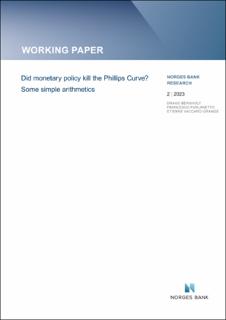Did monetary policy kill the Phillips Curve? Some simple arithmetics
Working paper
Published version
Permanent lenke
https://hdl.handle.net/11250/3050868Utgivelsesdato
2023Metadata
Vis full innførselSamlinger
Sammendrag
An apparent disconnect has taken place between inflation and economic activity in the US over the last 25 years, with price inflation remaining remarkably stable in spite of large fluctuations in the output gap and other measures of economic slack. This observation has led some to believe that the Phillips curve–a summary measure of aggregate supply–has flattened. We argue that this view may be premature and put forward a few, simple arithmetics which give rise to testable implications for demand and supply curve slopes. Equipped with New Keynesian theory and estimated SVAR models, we decompose the unconditional variation in US macro data into the components driven by demand and supply disturbances, and confront the inflation disconnect with our simple arithmetics. This exercise reveals a relatively stable supply curve slope once shocks to supply have been properly accounted for. The demand curve, instead, has flattened substantially in recent decades. Our results are at odds with a decline in the Phillips curve slope, but fully consistent with a shift towards a more firm monetary policy commitment to inflation stability.

